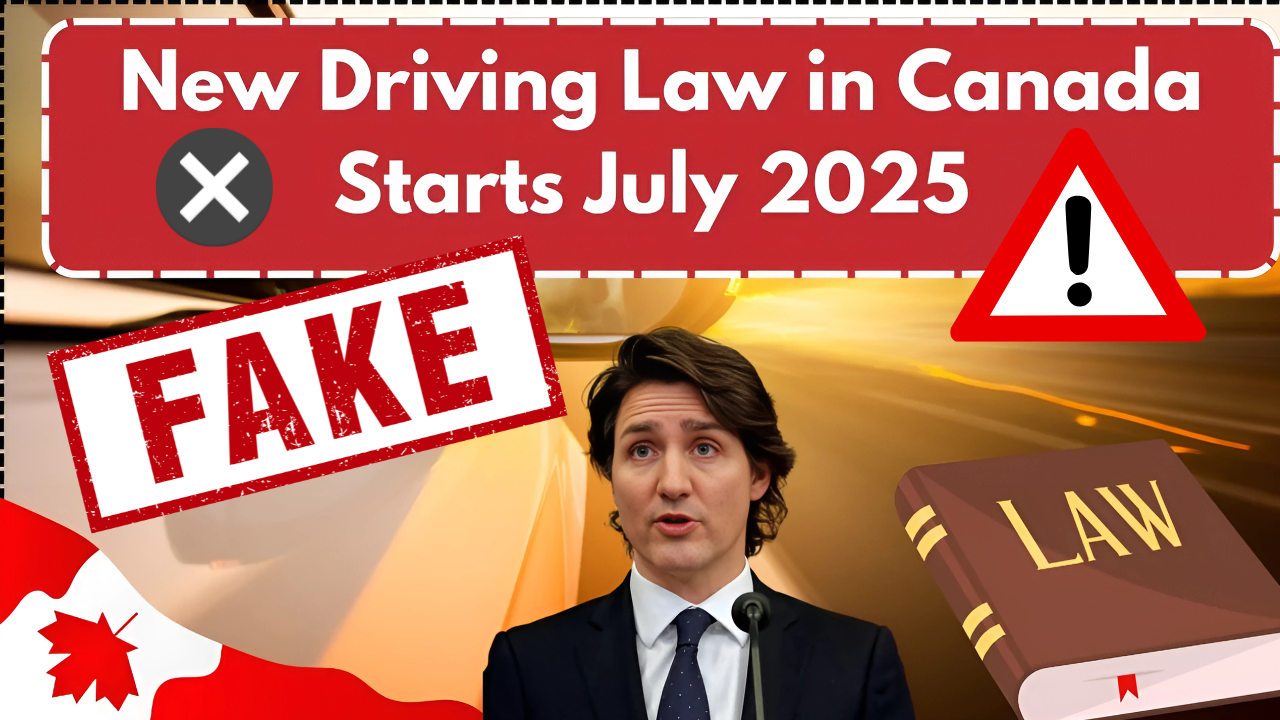Recent online claims about sweeping new Canadian driving laws set to take effect in July 2025 have caused confusion and concern among drivers. However, official sources confirm there are no new Canada driving laws scheduled for July 2025. This article will break down the misinformation, clarify the facts, and provide resources to help you stay informed.
Comparison Table: Claims vs. Reality
| Claim | Reality (Official) |
|---|---|
| Mandatory ADAS in new vehicles | No federal mandate; voluntary adoption encouraged |
| Distracted driving fines start at $600 | No nationwide $600 fine; fines vary by province |
| 24/7 30 km/h school zone speed limit | No federal rule; limits set by provinces/municipalities |
| BAC limit reduced to 0.05 | No federal change; remains 0.08 |
| AI-powered speed cameras | No national rollout planned |
| Type | Data Value |
|---|---|
| Article Title | No New Canada Driving Laws Coming in July 2025 |
| Date Published | June 24, 2025 |
| Author | Immigration News Canada |
| Main Entity | Canada Driving Laws |
| Description | Debunks fake news about new driving laws in Canada for July 2025 |
| Keywords | Canada driving laws, ADAS, distracted driving |
| Source | immigrationnewscanada.ca |
| Government Source | canada.ca/en/immigration-refugees-citizenship/services/settle-canada/driving.html |
The Viral Hoax: What’s Being Claimed?
A wave of sensational headlines and social media posts has spread the following claims about new driving laws in Canada for July 2025:
-
Mandatory Advanced Driver-Assistance Systems (ADAS): Allegedly, all new cars sold in Canada must have features like lane-keeping assist, automatic emergency braking, and adaptive cruise control.
-
Stricter Distracted Driving Laws: Supposedly, fines for using smartwatches or smart glasses while driving will start at $600, with license suspensions for repeat offenders.
-
24/7 School Zone Speed Limits: A rumored nationwide 30 km/h speed limit in school zones at all hours.
-
Lower BAC Limits: Claims that the legal blood alcohol concentration (BAC) limit will drop from 0.08 to 0.05 across all provinces.
-
AI-Powered Speed Cameras: Alleged high-tech cameras that adjust based on traffic patterns.
These stories often appear on lesser-known websites, citing vague “government plans” or “upcoming reforms” without official documentation.
The Truth: No New Driving Laws in July 2025
Official sources, including Transport Canada and provincial transportation ministries, confirm that no new driving laws are scheduled for July 2025. Here’s a detailed breakdown:
-
No Mandatory ADAS: While ADAS technologies are becoming common in new vehicles, there is no federal mandate requiring them by July 2025. Transport Canada encourages voluntary adoption but has not announced any mandatory requirements.
-
No New Distracted Driving Fines: Distracted driving laws vary by province, and fines (e.g., $615 in Ontario or $368 in British Columbia as of 2025) are already in place. No nationwide $600 fine or new rules about smart glasses have been proposed.
-
No 24/7 School Zone Speed Limits: School zone speed limits are set by provinces and municipalities, not federally. There is no evidence of a nationwide 24/7 rule.
-
No Lower BAC Limit: The legal BAC limit remains 0.08 across Canada, with some provinces enforcing stricter administrative penalties at 0.05. No federal change to 0.05 is planned for 2025.
-
No AI-Powered Speed Cameras: While some cities use photo radar, there is no national rollout of AI-powered cameras planned for July 2025.
How to Spot and Avoid Misinformation
Misinformation about new driving laws can cause unnecessary panic and confusion. Here are some tips to protect yourself:
-
Check Official Sources: Always verify claims with trusted sources like canada.ca or provincial transportation websites (e.g., Ontario’s Ministry of Transportation).
-
Be Skeptical of Sensational Headlines: If an article about new driving laws lacks specific details or cites unofficial sources, it’s likely clickbait.
-
Avoid Unverified Websites: Stick to reputable news outlets or government portals.
Current Driving Laws in Canada
Here’s what you need to know about current driving laws in Canada:
-
Driver’s Licence: You must have a driver’s licence issued by your province or territory to drive legally in Canada. You can use a valid foreign driver’s licence for a short time after arrival, but you may need an International Driving Permit (IDP) for translation.
-
Driving Tests: The process to get a driver’s licence varies by province and may include written and driving tests.
-
Insurance: You must have valid car insurance to drive in Canada.
-
Renewal: Driver’s licences must be renewed periodically, as indicated on the licence.
Why the Misinformation Is Spreading
The spread of false information about new driving laws is part of a broader trend of online disinformation. Here’s why these myths are gaining traction:
-
Clickbait for Traffic: Some websites use sensational headlines to lure clicks and boost traffic.
-
Exploiting SEO Tactics: These sites use SEO strategies to rank high on Google and appear in Google Discover feeds.
-
Vague Credibility: Articles often reference “government plans” or unrelated laws to seem legitimate, but lack concrete sources.
-
Social Media Amplification: Posts on platforms like X spread these claims without fact-checking.
Q: Are there any new driving laws in Canada for July 2025?
A: No, official sources confirm there are no new driving laws scheduled for July 2025.
Q: Will all new cars need to have ADAS features?
A: No, there is no federal mandate requiring ADAS in new vehicles by July 2025.
Q: Are school zone speed limits changing nationwide?
A: No, school zone speed limits are set by provinces and municipalities, not federally.
Misinformation about new driving laws in Canada is widespread, but official sources confirm that no new laws are coming in July 2025. Always check trusted government websites for the latest updates and avoid falling for clickbait headlines.
